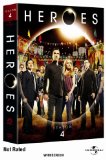| Reviews & Columns |
|
Reviews DVD TV on DVD Blu-ray 4K UHD International DVDs In Theaters Reviews by Studio Video Games Features Collector Series DVDs Easter Egg Database Interviews DVD Talk Radio Feature Articles Columns Anime Talk DVD Savant Horror DVDs The M.O.D. Squad Art House HD Talk Silent DVD
|
DVD Talk Forum |
|
|
| Resources |
|
DVD Price Search Customer Service #'s RCE Info Links |
|
Columns
|
|
|
Heroes: Season Four
A merciful end to the up-and-down super-saga
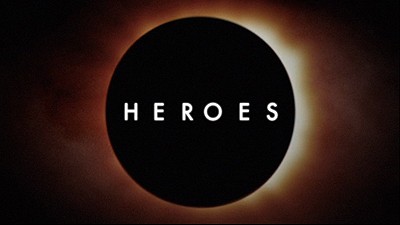
Reviewer's Bias*
Loves: Heroes Season One
Likes: Comic books, Hiro, Sylar
Dislikes: Convenient plot twists, Peter, "Heroes" Season Two and Three
Hates: How it all ends
The Story So Far...
The story of an assortment of everyday people who suddenly discover they have special powers and are connected in ways they can't imagine, Heroes was as ambitious as anything seen on TV before. NBC hit it big with the concept as viewers followed Japanese geek Hiro and his friends in their attempts to save the cheerleader and save the world, only to get let down by the second season's less enthralling storylines and season three's awkward attempts at relevance. Universal released the first season of the series on DVD in August of 2007, and followed it with the following two seasons on an annual basis. DVDTalk has reviews of the three previous seasons.
The Show
I don't think there's ever been a TV show on the airwaves like Heroes, for one simple fact: I can't think of a single television series whose cancellation was actively wished for by its fans. As the fate of Heroes twisted in the wind, and rumors of a shortened fifth season or a mini-series floated across the Web, many of the faithful followers of the series hit their knees before bed and prayed to their deity of choice for NBC to do the right thing and cut the cord on a series that started so promising and ended so pathetically. And in the end, NBC made one of their rare smart moves and put an end to the Heroes story, giving all those who suffered through years of teasing potential and frustrating failures the chance to finally walk away (thought not before offering up one of the most thrilling lines Sylar ever had a chance to say (providing one last tease.))
After giving up on the show at the start of Season Three, and catching up on DVD, I decided to climb right back on board for Season Four, watching each episode as it aired, and wondering just why I did it. I justified it to myself, by saying, I've put four years into this show, and I can't just leave it now. So I kept watching, no matter how insulting to the audience's intellect the stories would get, how silly the characters would act or how slow the pacing would become. And Season Four would test the very limits of how abused a fanbase can be, with an 18-episode long slog through a story that should have lasted a small handful at most.
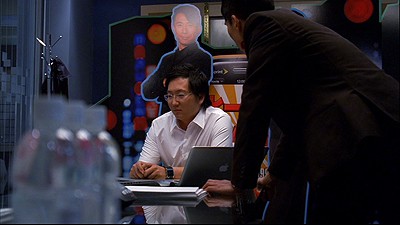
The big storyline this time out centers around Samuel Sullivan and his family of superpowered carnies. Samuel is busy building the group, recruiting various super-powered individuals to join them, in an effort to form a homeland of their own (shades of Magneto's Genoshan nation in the old X-Men comics.) As is usually the case with any story on Heroes, thanks to the need to add twists and turns to pad out episodes, it's not that simple, and, of course, all of the show's main characters will be drawn into the tale. It seems that the Heroes have the best contact system known to man, as no one misses an e-mail or call to get together. You never hear Hiro say, "No one told me we were having a superbrunch!" At some point, coincidence and contrived are very similar. Either way, the show tries to have it both ways with Samuel, attempting to make him both pure evil and a sympathetic soul, like they did with Sylar, which makes this another example of the show repeating itself.
While the inexplicably coincidental familial concerns of the Petrelli clan keep going for yet another run of episodes, adding in a new super-powered love interest for Peter, the relationship between Claire and her father Noah is the show's secondary focus, as Claire goes off to college in an attempt to live a normal life, and ends up in a lesbian couple with the youngest daughter from The Nanny, while displaying her trademark poor judgment and weakly-motivated rebeliousness. Meanwhile, Dad's whole world is falling apart in a super-midlife crisis. Honestly, the whole lesbian bit is so pointless and pandering that it barely even matters (even if it is one of the most memorable happenings) and the rest of her storyline is just a rehashing and extension of what we've been putting up with since we first found out the cheerleader needed saving. Rarely has a hot chick ever grown so tiresome.
The rest of the old crew are still around as well, including erstwhile samurai Hiro, who's battling a terminal illness and trying his hand at being a hero-for-hire, and Matt Parkman and Sylar, who get closer than they'd really like to be in the aftermath of Season Three. Though the conflict between them is one of the better tales told, and Sylar (played by Zachary Quinto) remains one of the most interesting characters in recent TV history, the origin of this arrangement is probably one of the biggest issues with this season, as this major portion of the story makes absolutely no sense, in any way. I don't want to include spoilers, so all I say is, the creators behind this series got greedy when it came to their popular characters, and would break any rule of logic or storytelling to keep them around. Even worse, they stretched this out over the vast majority of the season, utilizing the show's greatest weakness, an inability to pace storylines well. You can go an episode or two without returning to a character, a result of having too many characters to focus on in one show. It makes it hard to keep engaged, when you know you can expect to not see them for a while.
The worst part of the season though has to be the ending. After you've sat through 18 episodes of questionable quality and a cliched, mediocre story, (not to mention the three years of shows you watched before) you're confronted with possibly the worst climax in the history of superhero storytelling. Honestly, as it was happening, I thought, "This isn't the way it's going to end, is it?" Then, I thought, "Wow, that's really how it's going to end." Sure, they put a tidy little coda on the series that bookended everything nicely (and tied up Hiro's tale to a reasonable degree,) while also allowing for a Season Five that thankfully never came, but the way the carnival tale wrapped up gives the perfect chance to paraphrase T.S. Eliot and say, "This is the way Heroes ends. This is the way Heroes ends. This is the way Heroes ends. Not with a bang, but with a whimper."
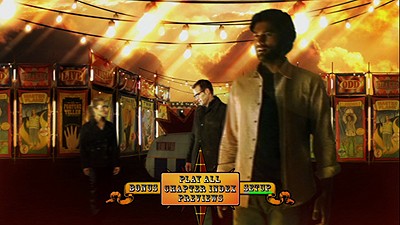
The DVDs
With the episode count down seven to just 18, the set loses a disc, shrinking to five DVDs, which are packed in a three-tray, three-panel digipak with episode descriptions and extras information, which comes in a stiff slipcase with embossed holofoil cover art (continuing the look of the previous sets.) The carnival theme inside the case is actually quite nice. The discs feature similar animated anamorphic widescreen menus to the previous sets, with options to play all, select episodes, check out the bonus material and adjust languages. There are no audio options, but subtitles are available in English SDH, Spanish and French, though there's no closed captioning.
The Quality
Once again, the anamorphic widescreen transfers on these discs look tremendous, coming in a notch below the original HD broadcasts, though they still sport rich, appropriate color and a strong amount of fine detail. Sometimes, it's such a sharp image that the special effects stand out too much, but overall, it's a fine presentation, free of anything obvious in terms of digital artifacts or dirt and damage.
If I'll miss anything from Heroes, it was the attention to detail in terms of the quality of the production, and the Dolby Digital 5.1 audio tracks on the DVDs stand as testimony to that effort, with center-focused dialogue coming through clean and clear, alongside the atmospheric music. The side and rear speakers boost the sound effects, music and small touches, making for a very engaging mix.
The Extras
On the previous sets, every episode got a commentary; tracks that were ported over from the show's Web site. That's not the case this time, as apparently pending cancellation doesn't lend itself to wall-to-wall coverage, so weekly online video commentaries weren't done. Instead, we get four commentaries on some of the more important episodes in Season Four, with creator Tim Kring appropriately present on three of them, to give his perspective, as well as a video intro to the commentary on the series finale, where he offers a short message to the fans about the series' cancellation (shortly after hearing the news himself.)
There's a touch more perspective on these commentaries than in previous sets, as they were recorded around early Ferbruary 2010, after most of the season had already aired. There's a lot of praise going around, which is to be expected, but there's a lot of talk about the story and how the show was produced, especially when Greg Grunberg and Adrian Pasdar are on hand, as they put a lot of thought into their thoughts about the show. There's still hope (and perhaps expectation) in the participants that a fifth season was coming, so you don't get a true looking-back experience, but they still offer some quality insight on the making-of the series.
- Once Upon a Time in Texas: Kring, director Nate Goodman and DP Charlie Lieberman
- Shadowboxing: producers Adam Armus & Kay Foster and actor Greg Grunberg
- The Fifth Stage: Kring and actor Adrian Pasdar
- Brave New World: Kring and actor Robert Knepper
Once again, there's a good amount of deleted scenes, 28 scenes running 45 minutes in all. Some of them are unnecessary scene extensions, but there are also some bits with interesting dialogue and the occasional oddity, like strange voiceovers and visible strings for special effects. It's curious to see that some episodes have much more excised material than the others, as seven shows have just one scene.
The thing no one can deny about the Heroes DVDs no one could deny is the depth of the featurettes offered, and that's true even here after the final season, starting with "Deconstructing Sylar," an informal conversation between Quinto, Kring and Armus on the set. As they talk, and you watch some behind-the-scenes footage, you get to learn about the origin of the character and his trademark display of power, and how he was developed, along with some bits about Quinto's process, and an interesting note about how they would reboot the series when characters strayed from their focus (which may explain why the series seemed to repeat itself so often.) A fun, informative bit of background on the series.
"Milo Speaks" gives Milo Ventimiglia 5:29 to talk about his interests in the world of superheroes and art, his thoughts about working with Pasdar, his brother in the series and his future plans. For fans of his, or of the Petrelli boys, it's a short bit of celeb profile to enjoy. It's followed by a 2:31 automatic gallery of design work for the Sullivan Brothers carnival, which shows sketches and plans, followed by footage of the eventual sets and props, an example of why the show always looked terrific.
Fans of the show's inspiration will find something to like in the 10:25 "Heroes Revolution," a featurette focused on the show's utilization of new media, including the series' graphic novels, web content and social media interaction. Unfortunately, none of this helped keep the show on the air, and it honestly may have robbed the series of some of its focus, but if you're curious about this new way of telling TV stories, the info is here, with interviews with some of the crew involved.
The final extra sees the return of "Genetics of a Scene," the fun featurettes displaying how a scene came together, normally one with a good deal of special effects work. These on-set footage-heavy pieces are as unfiltered a look at the making of the show as you're going to get, with the added bonus of getting to hear from the cast and crew involved. With no seasons remaining, they apparently decided to empty the vaults, with seven entries, checking in at a combined 42 minutes of material. If you have any interest in how television is made, especially things like CG and practical effects, these are a must-see.
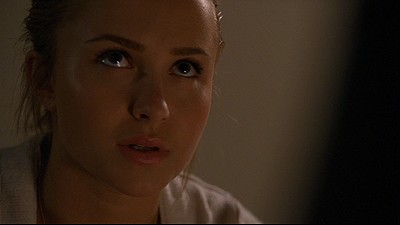
The Bottom Line
Looking back, it's amazing to see how far Heroes fell in such a short period of time, possibly a victim of the writers strike that derailed its momentum, but more likely a victim of pure excess and overexposure in terms of the characters. That's what Season Four is all about, stretching a thin story well beyond its breaking point while once again repeating the same story devices with characters we've already grown tired of. The presentation is solid once again, and the extras are excellent for a cancelled series, but if you haven't been in this world at this point, it's not worth starting, as there's not enough payoff. If you've invested some time though, see it through to the end, and see if you don't feel a bit more complete inside by saying your last goodbyes.
Francis Rizzo III is a native Long Islander, where he works in academia. In his spare time, he enjoys watching hockey, writing and spending time with his wife, daughter and puppy.Follow him on Twitter
*The Reviewer's Bias section is an attempt to help readers use the review to its best effect. By knowing where the reviewer's biases lie on the film's subject matter, one can read the review with the right mindset.
|
| Popular Reviews |
| Sponsored Links |
|
|
| Sponsored Links |
|
|
| Release List | Reviews | Shop | Newsletter | Forum | DVD Giveaways | Blu-Ray | Advertise |
|
Copyright 2024 DVDTalk.com All Rights Reserved. Legal Info, Privacy Policy, Terms of Use,
Manage Preferences,
Your Privacy Choices | |||||||









